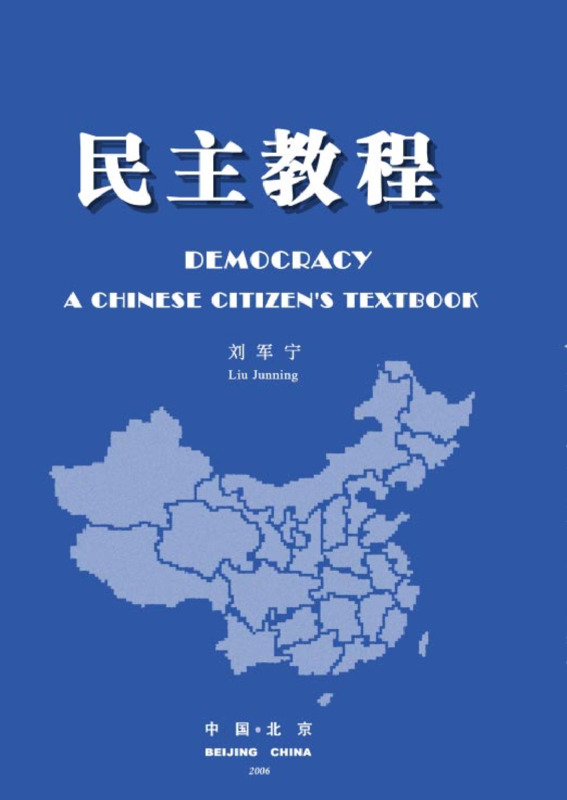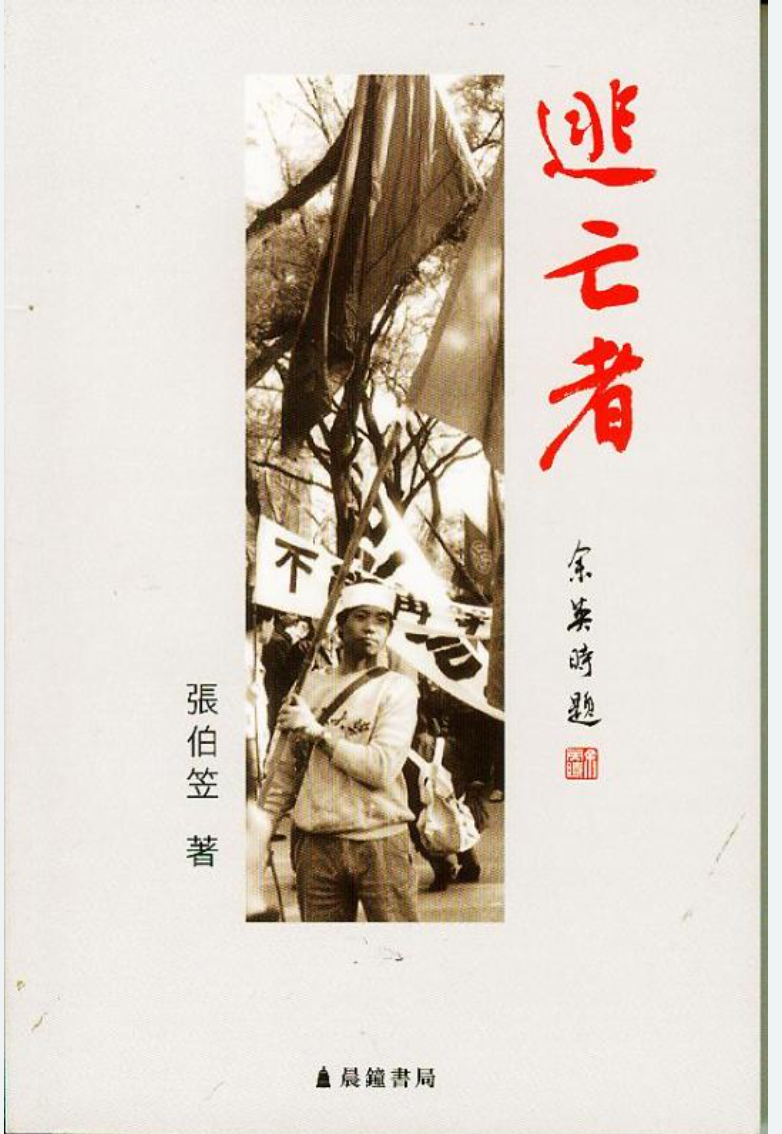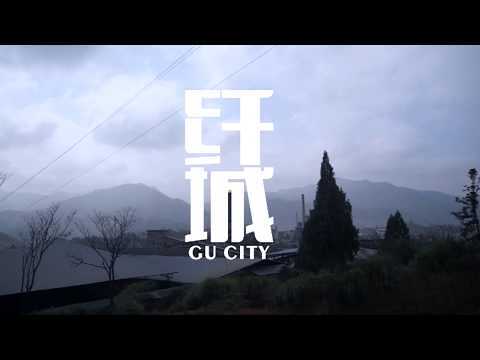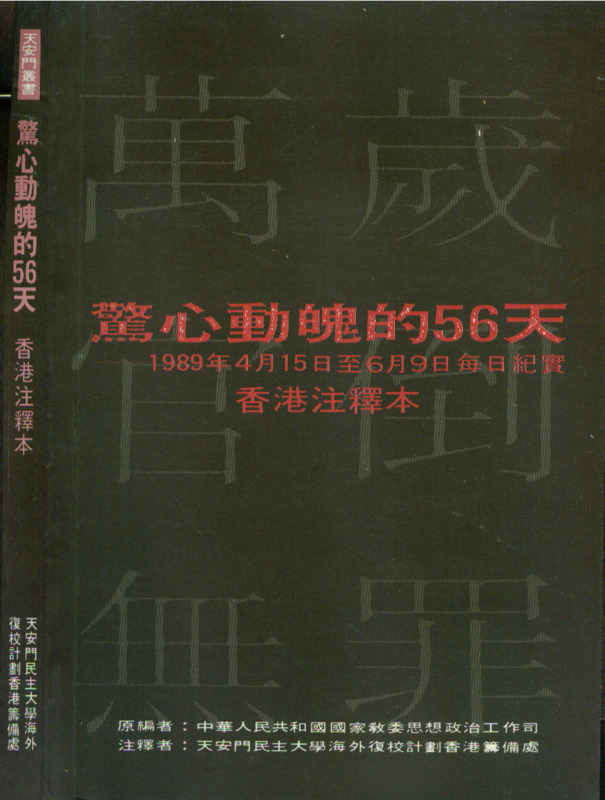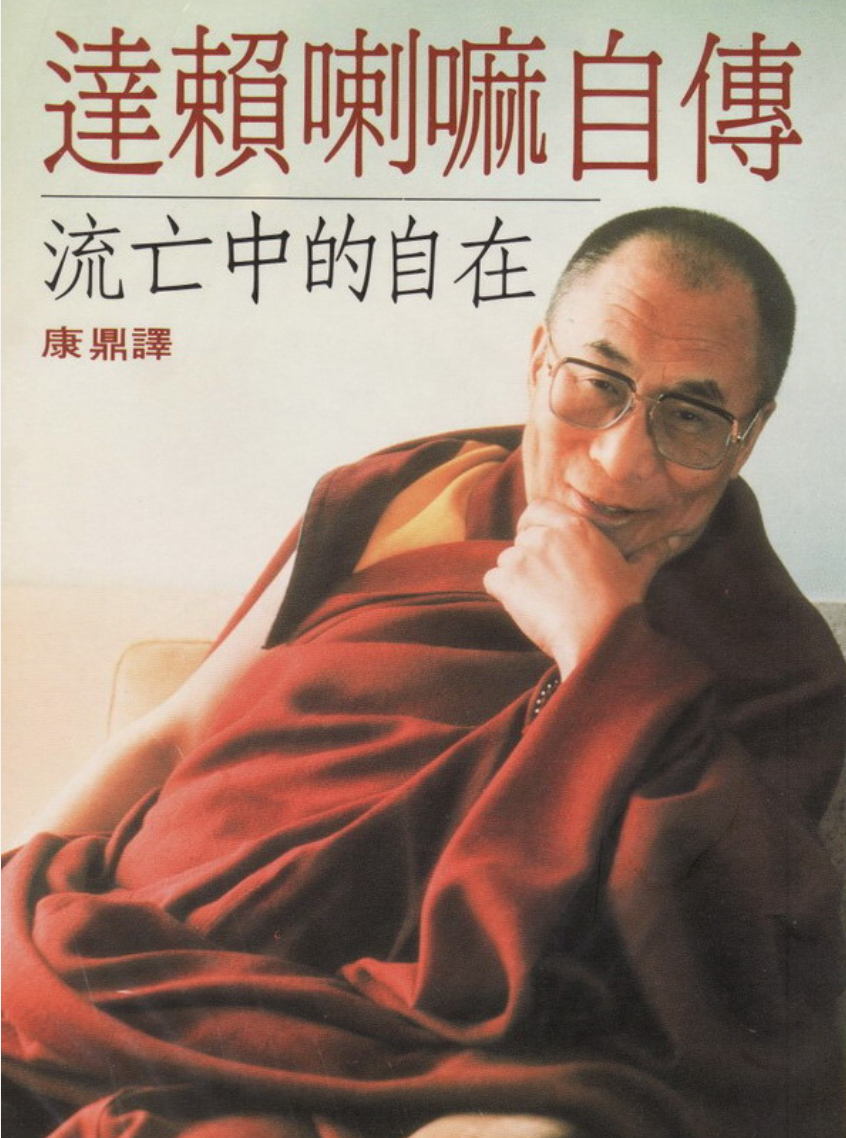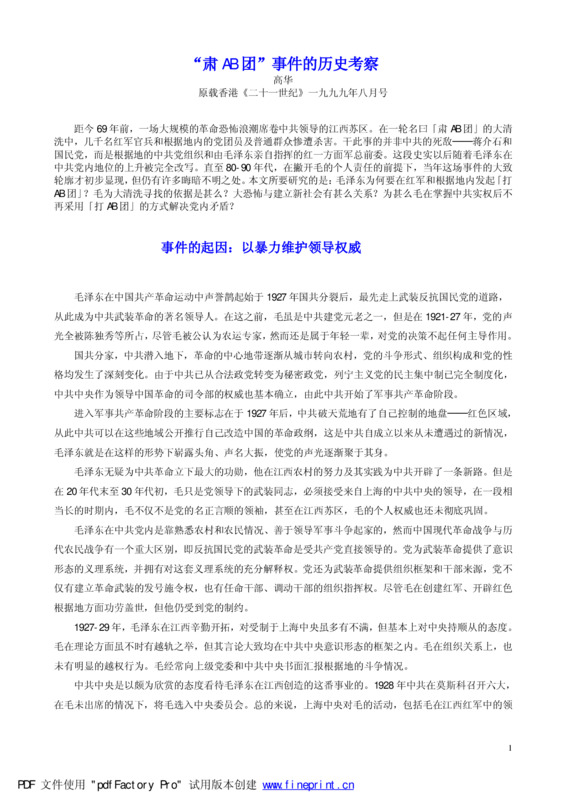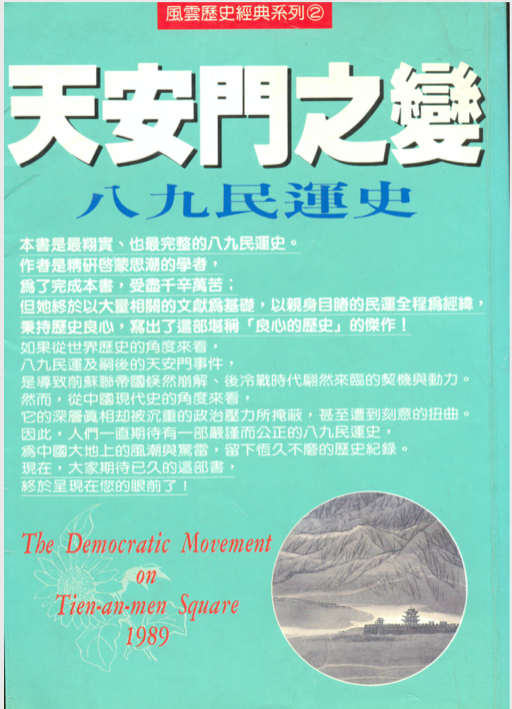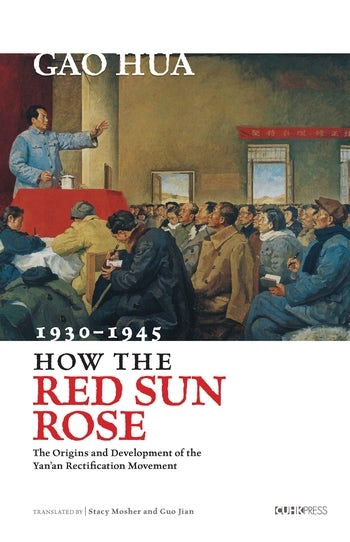Explore the collection
Showing 174 items in the collection
174 items
Official Documents
Declassified Files of the Canadian Government on the June Fourth Incident
This document, declassified in January 2015, contains a 1989 diplomatic memorandum from the Canadian Embassy in Beijing. It describes the circumstances surrounding the June 4 massacre as they were known to officials at the Canadian embassy.
The documents, declassified by the National Library and Archives of Canada, show the Canadian government's concern about the invasion of the embassy by Chinese troops. The documents also describe the crackdown in Beijing and how the troops killed citizens.
Book
Democracy Curriculum
Written by Chinese liberal intellectual Liu Junning, this book circulated underground in 2006. The book parses the fundamentals of democracy as well as historical experience. It was quickly banned in China.
Book
Earthquake Insane Asylum
On May 12, 2008, when the Great Sichuan Earthquake struck, writer Liao Yiwu began to write "Chronicle of the Great Earthquake", which was serialized in <i>Democratic China</i> and reprinted on several Chinese websites. It had a wide impact. Liao went to Dujiangyan, Juyuan Township, Yingxiu and other earthquake-hit areas to conduct on-the-spot interviews. His travels and writings during the earthquake were reported and translated by many mainstream media.
In April 2009, Taiwan's Asian Culture Publishing published and distributed the traditional Chinese edition of <i>Earthquake Insane Asylum</i>, a pictorial and textual factual record that preserves the living conditions of the people during of the Sichuan earthquake.
Film and Video
Enemy of the State
On February 9, 2010, Tan Zuoren was tried in the Chengdu Intermediate People’s Court for the crime of inciting subversion against the state. Ai Xiaoming and her team recorded the three days before and after the verdict, the mindsets of Tan Zuoren’s friends and relatives, and how the lawyers carried out their work.
This film is in Chinese with Chinese subtitles.
Book
Escape From China: The Long Journey from Tiananmen to Freedom
Author Zhang Boli, a former student leader of the June 4 Democracy Movement, was ranked 17th on the "21 Most Wanted List." After June 4, Zhang Boli went into hiding in his hometown in Northeast China and crossed the border into the Soviet Union, where he was detained and repatriated by the Soviets. The Soviets did not hand him over to the Chinese border guards, but let him leave on his own. In the two years following June 4, Zhang Boli was the only June 4 pro-democracy leader who was neither captured by the Chinese Communist Party nor able to flee China. It was not until 1991 that Zhang Boli arrived in Hong Kong through secret channels and applied for political asylum at the U.S. Consulate. *Escape From China:The Long Journey from Tiananmen to Freedom* was published and translated into many languages. The English version won the Washington Post's "Best Book Award".
Film and Video
Faraway Mountain
This movie captures the lives of miners in small coal mines in the Qilian Mountain area of Qinghai Province. At 3600 meters above sea level, the air here is thin. Miners in the small coal kilns labor hard in a working environment without any protection, and usually get silicosis after 5-10 years of work, thus losing their ability to work. If they die in an accident, their families receive only meager compensation. This is a true record of the survival of China's grassroots laborers in the early 1990s.
Film and Video
Fiber City
Fiber City—the collective name Fujian Textile and Chemical Fiber Factory—was founded in 1971. China's first production in the 1970s, one of the nine Vinylon factories located in Yongan City, Fujian Province, deep in the mountains, 3 kilometers outside the outskirts of the industrial town. Once glorious, it has been gradually lowering its curtains. The old factory buildings are mottled, its young workers are now gray-haired, and many have left. The documentary shows the fate of this big factory during the planned economy.
Book
Fracture—Chinese society since the 1990s
This monograph by Sun Liping, a professor at Tsinghua University, was published by China Literature Publishing House in 2003. The author systematically analyzes a series of changes in Chinese social life since the 1990s. The book discusses the meaning and characteristics of fractured society; the formation and background of fractured society; widening income gaps and the formation of vulnerable groups; the new urban-rural dual structure; trust crisis and social order; social conflicts and institutional innovation, etc.
Book
Gan Cui: The Soul of Peking University-From Lin Zhao to the 1989 Democracy Movement
This book was originally published in the series *Micro Traces of the Past* - Documentary Volume - No. 6, edited by Huang Heqing, founded in 2007. Gan Cui, a student at Renmin University of China, was classified as a rightist in 1957. He became lovers with Lin Zhao, a rightist student who came from Peking University to work in the data room. Gan Cui was later sent to Xinjiang. When he returned, he learned that Lin Zhao had been killed. This book (in 140,000 words) is a manuscript of Gan Cui's memories of Lin Zhao in the context of the 1989 pro-democracy movement.
Film and Video
Garden of Paradise
The year 2003 was known as the birth of the Weiquan—the rights defense–movement, which was marked by the Sun Zhigang incident in Guangzhou. At the same time, a campaign began to get justice for Huang Jing, a teacher from Hunan who was sexually assaulted and killed by her boyfriend. The campaign involved the victim’s family, netizens, feminist scholars and activists, and lasted for several years. This documentary records the process of Huang Jing’s case from filing to post-judgement, and analyzes the broader issue of sexual violence against women in China.
The films in this series are in Chinese with Chinese subtitles.
Book
Great Power Sinking: A Memo to China, A
This book is a collection of political essays by Nobel Peace Prize winner Liu Xiaobo. It is a sister volume to *Single-Edged Poisoned Sword - A Critique of Contemporary Nationalism in China*, which covers many aspects of Chinese politics, including: one-party dictatorship, powerful capitalism, rights defense, June Fourth, and nationalism.
Article
Historical Examination of the Purge of the "AB" Regiment
More than 70 years ago, a massive wave of revolutionary terror swept through the CCP-led Jiangxi Soviet Union. Thousands of Red Army officers and soldiers, as well as members of the Party and the general public in the base area, were brutally murdered in a purge called the "Purging of the AB Troupe." Gao Hua's article examines why Mao Zedong initiated the "purge of the AB Group" in the Red Army and the base areas. What was Mao's rationale for the Great Purge? What is the relationship between the Great Terror and the establishment of a new society? Why did Mao stop using the "Fighting the AB Groups" as a means of resolving internal conflicts in the Party after he assumed real power in the CCP?
Book
History of the 1989 Democracy Movement
This 10-volume book of 1.3 million words was written by Chen Xiaoya, a former associate researcher at the Institute of Political Science of the Chinese Academy of Social Sciences. The first edition was written in April 1994 and published in Taiwan in 1996, but with just over 200,000 words. Later, Chen Xiaoya revised the book several times to increase its content: starting from 1976, the year of Mao Zedong's death, and covering Hu Yaobang's political career as well as the background of the June Fourth Incident and also adding the contents of the memoirs of the parties involved in the June Fourth Incident. The number of words was increased to 1,360,000 words in 2016 when the book was published. The book was reprinted in 2019.
Purchase link:https://www.amazon.com/%E3%80%8A%E5%85%AB%E4%B9%9D%E6%B0%91%E9%81%8B%E5%8F%B2%E3%80%8B%E3%80%8A%E5%85%AB%E4%B9%9D%E6%B0%91%E8%BF%90%E5%8F%B2%E3%80%8B-%E7%AC%AC%E5%85%AB%E5%8D%B7-DEMOCRACY-MOVEMENT-Traditional-ebook/dp/B07VN848V8
Book
History of the Chinese Thought Movement
This book is a masterpiece by Chinese scholar Li Honglin. The author was a representative of the ideological liberation movement during reform and opening up and was arrested after the Tiananmen Square incident in 1989. This book summarizes the various ideological purges launched by the CCP since its establishment in 1949.
Book
How the Red Sun Rose
Originally published in Hong Kong in Chinese in 2000, Gao Hua’s epic description of an early Communist Party campaign against dissent describes a pattern of thought reform and control that would hold true for decades to come. Written despite official harassment and Gao’s failing health, How the Red Sun Rose is a touchstone for China’s unofficial history movement. It was translated into English in 2019 and published by Columbia University Press. Purchase here: https://cup.columbia.edu/book/how-the-red-sun-rose/9789629968229.
Book
In Search of My Homeland
“In Search of My Homeland” is a collection of essays in three volumes written by Gao Ertai during his exile abroad. In this book, Gao looks back on his life. From his hometown of Gaochun, a small town in Jiangsu Province, to Suzhou, then to Lanzhou, Jiuquan, Dunhuang, Beijing, Chengdu, and the United States, Gao has undergone tremendous suffering, lost his home and family, and finally had to go into exile in a foreign country. Even though the work is widely regarded as having great literary merit, Gao uses real names and places, which makes the work a valuable historical document, especially for describing the Great Famine, and the brutal suppression of intellectual life during the Cultural Revolution at the Dunhuang research academy, which is one of China's most prestigious cultural institutions.
In an [interview](https://web.archive.org/web/20240130211408/https://www.aisixiang.com/data/80804.html), Gao explained why he wrote the book: "Searching for my homeland is nothing but searching for meaning.... Life is short and small, and its meaning can only be rooted in the external world and in the long history. My sense of drift and meaninglessness, that is, a feeling that the world has no order, history has no logic, and the individual has no home, seems to be a kind of destiny. My writing is nothing but a resistance to this destiny."
In 2004, a censored version of the first two volumes of this book was published by Huacheng Publishing House in Guangzhou; in 2011, an updated version was published by Beijing October Arts and Literature Publishing House, but still censored. The version uploaded to our archive is the traditional Chinese version of the complete three volumes published by Taiwan INK Publishing House in 2009.
Book
In the Palm of Buddha (Updated Edition)
Zhang Dongsun is an unavoidable but deliberately obscured figure in modern China. Considered the earliest translator of Western philosophy, a famous newspaperman, political commentator, and professor at Yenching University; the first mediator between the Kuomintang and the Communist Party in 1949, and the first Central People's Government Member. He was convicted of treason in 1951 and disappeared. The well-known writer and journalist Dai Qing completed this historical documentary after eight years of investigation and writing and nearly ten years of revising and updating. Taking Zhang Dongsun's life as the main theme, he wrote about changing times from the late Qing dynasty to the Cultural Revolution.
An expanded edition of this book will be published by the Chinese University of Hong Kong Press in 2022. The following is the link to purchase books from the publisher:
https://cup.cuhk.edu.hk/index.php?route=product/product&product_id=3466

